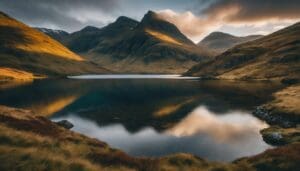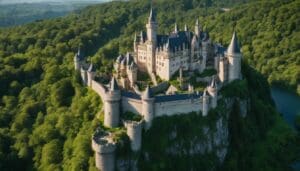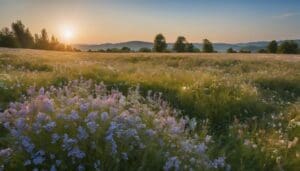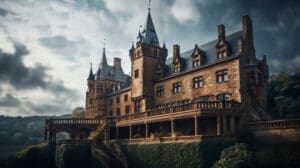Visit Pleven, Bulgaria
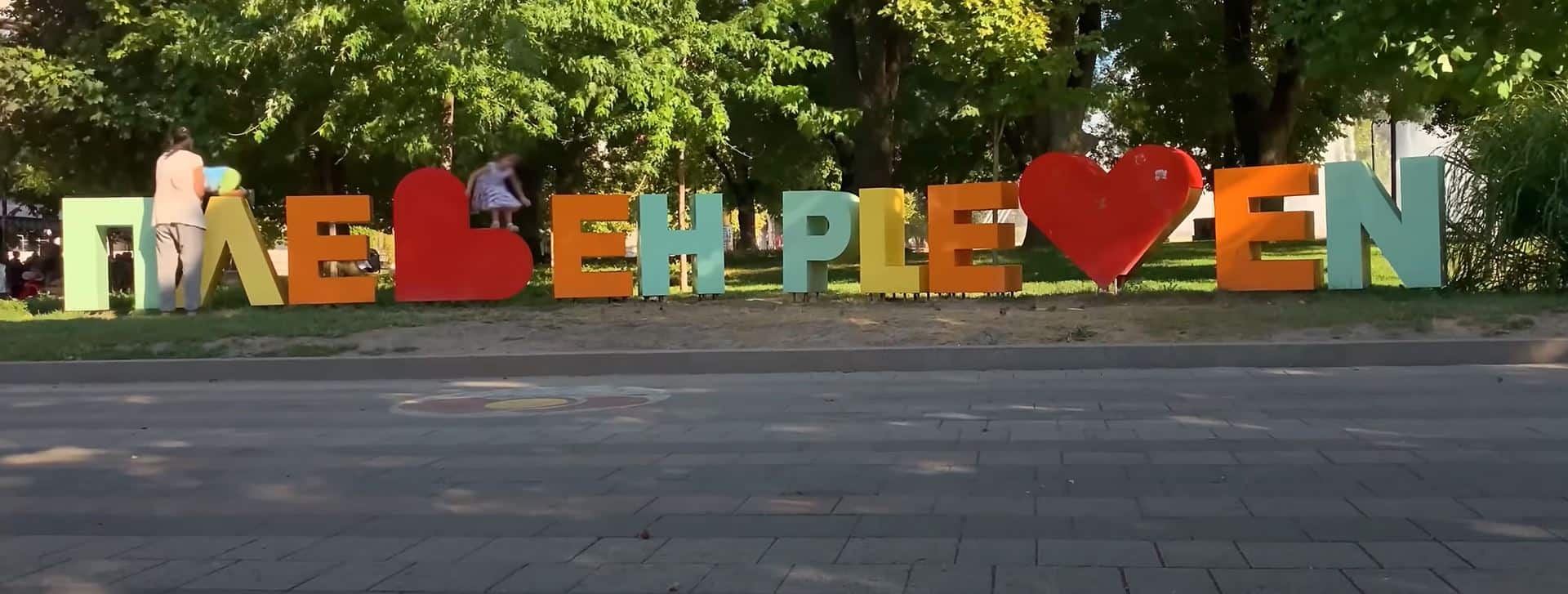
Updated On: March 15, 2024 by Ahmed Samir
Tucked away in the enchanting landscapes of Eastern Europe, Pleven, Bulgaria, awaits discerning travellers searching for an extraordinary fusion of history, culture, and natural splendour. While Bulgaria may not be the most frequented destination in Europe, Pleven’s historical tapestry, picturesque panoramas, and the warm embrace of its residents make it a destination deserving of greater recognition. In this comprehensive article, we embark on a journey through the city, unearthing its historical significance, unmissable attractions, and compelling reasons why it should be at the top of your travel bucket list.
Unveiling Pleven’s Historical Tapestry
Pleven is the seventh-largest city in Bulgaria and serves as the administrative centre of the city Province. Located in the northern part of the country, it is approximately 170 kilometres (105 miles) away from the capital city of Sofia. Pleven’s history dates back to ancient times, with evidence of settlements from the Bronze Age and the Thracian period. However, its proper prominence in history came during the late 19th century during the Russo-Turkish War, when the city was crucial in liberating Bulgaria from Ottoman rule.
Historical Significance
- The Siege of Pleven: One of the defining moments in Pleven’s history was the Siege of Pleven, which occurred between 20 July 1877 and 10 December 1877, during the Russo-Turkish War. The city was under Ottoman control then, and its liberation was essential for liberating Bulgaria from Ottoman rule. Under the leadership of the Russian General Mikhail Skobelev, Russian forces besieged the city for several months. The siege ended with the Ottoman surrender and the eventual liberation of Bulgaria, making the city a symbol of national pride and independence.
- Pleven Panorama: To commemorate the historic siege, the Pleven Panorama was created in 1977 to mark the 100th anniversary of the event. This unique museum is housed in a circular building, where a massive panoramic painting depicting the siege is displayed. Visitors can enter the painting and experience the battle up close, accompanied by detailed exhibits and artefacts from that period. The Pleven Panorama is a must-visit for history enthusiasts and provides a captivating insight into this significant moment in Bulgaria’s history.
Attractions in Pleven
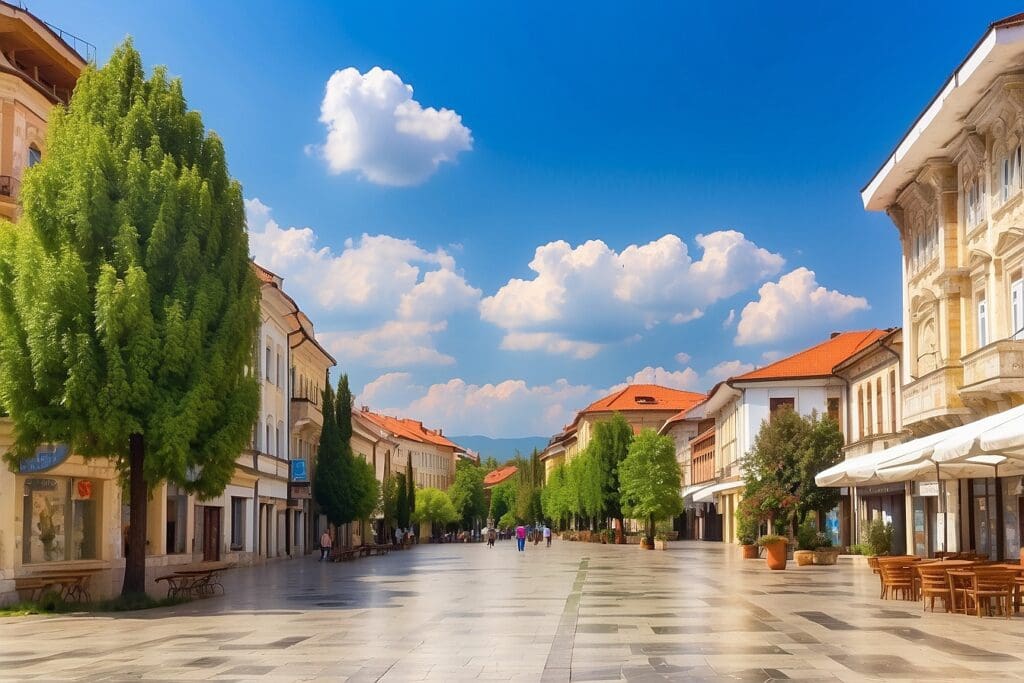
Kaylaka Park
Kaylaka Park is a tranquil oasis for nature lovers just outside the city. This sprawling natural reserve covers an area of over 600 hectares and offers hiking trails, serene lakes, and lush forests. Visitors can explore the park’s diverse flora and fauna, making it an ideal destination for outdoor activities such as hiking, picnicking, and bird-watching. The park also features a scenic viewpoint overlooking the city, providing breathtaking panoramic views.
Skobelev Park
Named after the Russian General Mikhail Skobelev, Skobelev Park is a beautiful urban park in the city’s centre. It features well-maintained gardens, walking paths, and a central lake with swan boats. The park is famous for locals and tourists, offering a peaceful environment for relaxation and strolls.
The Historical Museum
Pleven’s Historical Museum is a treasure trove of artefacts and exhibits that showcase the city’s rich heritage. Housed in a beautiful Neo-Renaissance building, the museum offers a comprehensive journey through the city’s past. Visitors can explore archaeological finds, ethnographic collections, and exhibits related to the Russo-Turkish War and the Siege of Pleven. The museum provides valuable insights into the city’s development and role in Bulgarian history.
The St. George the Conqueror Chapel-Mausoleum
Located in Skobelev Park, the St. George the Conqueror Chapel-Mausoleum is a significant historical and cultural site. It honours the memory of those who lost their lives during the Siege of Pleven. The chapel’s architecture is striking, blending Bulgarian and Russian styles. Inside, visitors can pay their respects and learn more about the heroes of the siege through exhibits and memorials.
The Art Gallery
Art enthusiasts will appreciate visiting Pleven’s Art Gallery, which houses a diverse collection of Bulgarian art spanning different periods and styles. The gallery features paintings, sculptures, and contemporary artworks created by local and national artists. It provides a glimpse into Bulgaria’s vibrant artistic scene and its contribution to the world of visual arts.
Cuisine and Culinary Delights
Exploring the city wouldn’t be complete without savouring its delicious cuisine. Bulgarian cuisine is known for its hearty and flavorful dishes; the city is no exception. Some must-try dishes and culinary experiences include:
- Bulgarian Banitsa: Start your day with a traditional breakfast by trying Banitsa, a savoury pastry made from layers of filo dough filled with cheese and often accompanied by yoghurt. It’s a delicious and filling way to begin your day.
- Kavarma: Kavarma is a mouthwatering Bulgarian stew made with tender pieces of meat (usually pork or chicken), vegetables, and a rich tomato sauce. It’s slow-cooked to perfection, resulting in a flavorful and comforting dish.
- Shopska Salad: For a refreshing and healthy option, sample the Shopska Salad. This colourful salad consists of diced tomatoes, cucumbers, bell peppers, onions, and feta cheese, drizzled with a dressing made from olive oil and vinegar.
- Bulgarian Wines: Bulgaria has a long history of winemaking, and Pleven is no exception. Be sure to try local wines known for their quality and unique flavours. Visit a local winery or wine cellar to experience the region’s wine culture firsthand.
Local Festivals and Events
To immerse yourself in Pleven’s vibrant culture and traditions, consider planning your visit around one of its local festivals or events. Some notable celebrations include:
- Pleven Carnival: Held annually in May, the Pleven Carnival is a colourful and lively event that features parades, street performances, and cultural exhibitions. It’s a fantastic opportunity to experience the city’s festive spirit and connect with locals.
- Pleven Wine Fest: Wine enthusiasts should take advantage of the Pleven Wine Fest, typically in September. This event celebrates the region’s winemaking heritage and allows visitors to taste local wines.
- National Liberation Day: On 3 March, Bulgarians celebrate their National Liberation Day, commemorating the country’s liberation from Ottoman rule. The city participates in the festivities with various events, including concerts, parades, and fireworks.
Accommodation and Getting Around
Pleven offers a range of accommodation options to suit various preferences and budgets. From boutique hotels to guesthouses and budget-friendly hostels, you’ll find a comfortable place to stay while exploring the city. It’s advisable to book your accommodations in advance, especially during peak tourist seasons.
Getting around the city is convenient and accessible. The city has a well-developed public transportation system, including buses and trams, making exploring its various attractions and neighbourhoods easy. Walking is also a pleasant way to discover the city’s hidden gems, especially in the city centre.
The Optimal Time to Explore Pleven
The best time to visit Pleven, Bulgaria, largely depends on your preferences and the type of experience you seek. The city experiences a continental climate with distinct seasons, offering a range of experiences throughout the year. The spring and early summer months, from April to June, are ideal for those who enjoy pleasant weather and outdoor activities. During this period, the temperatures are mild, and the city’s parks and natural reserves burst into full bloom, making it perfect for exploring the outdoors.
Summer is the peak tourist season from June to August when the weather is warm and sunny, and various festivals and events occur. However, it can be crowded, so booking accommodations in advance is advisable. From September to October, autumn brings cooler temperatures and vibrant foliage, creating a picturesque setting for nature lovers and those interested in local wine festivals. If you prefer a quieter and more budget-friendly visit, consider visiting during the cooler months of late autumn and winter, from November to March, when the city takes on a serene ambience, and you can experience the city’s historical and cultural attractions without the crowds.
Conclusion
Pleven, Bulgaria, may not be as well-known as some of Europe‘s major cities. Still, it offers a unique blend of history, culture, and natural beauty that will captivate any traveller. From its rich historical significance to its picturesque parks and delicious cuisine, the city has much to offer to those willing to explore its hidden treasures. So, if you’re seeking an off-the-beaten-path destination that promises a memorable experience, consider adding the city to your travel itinerary. You’ll discover a city that has played a vital role in Bulgaria’s history and offers a warm welcome to all who visit.
Pleven is a city that beckons you to uncover its layers of history, immerse yourself in its vibrant culture, and soak in the natural beauty that surrounds it. Whether you’re a history buff, a nature lover, or simply seeking an authentic and enriching travel experience, Pleven, Bulgaria, is a destination that should be considered.
FAQs
What are the transportation options in Pleven?
Pleven has a well-developed public transportation system, including buses and trams, making it easy to get around the city. Walking is also convenient for exploring the city centre and its hidden gems.
What is the historical significance of Pleven?
Pleven played a crucial role in Bulgaria’s history, particularly during the Russo-Turkish War when it was the site of the famous Siege of Pleven. The city’s liberation from Ottoman rule marked a significant milestone in Bulgaria’s struggle for independence.
Where is Pleven located in Bulgaria?
Pleven is situated in the northern part of Bulgaria and serves as the administrative centre of the Pleven Province.



